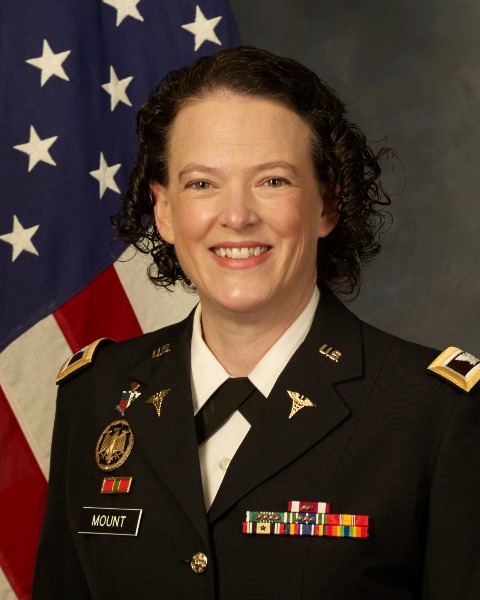Delirium, Dysautonomia, and Hyperthermia: An Incredibly Rare Case of Idiopathic Ventriculitis
-

Ketan Mehta, DO
Madigan Army Medical Center
Fort Lewis, WashingtonDisclosure information not submitted.
-
HK
Hannah Kelly, MD
M.D.
Madigan Army Medical Center, United StatesDisclosure information not submitted.
-
CC
Christopher Colombo, MD, MA, FCCM
Associate Professor
The Geneva Foundation
Gig Harbor, WashingtonDisclosure information not submitted.
-
RC
Rhonda Colombo, MD
M.D.
Madigan Army Medical Center, United StatesDisclosure information not submitted.
-

Cristin Mount, MD, FACP, FCCM
Cristin A. Mount, MD, FACP, FCCM, COL
Madigan Army Medical Center
Tacoma, Washington, United StatesDisclosure information not submitted.
-
CL
Charles Larcom, MD
M.D.
Madigan Army Medical Center, United StatesDisclosure information not submitted.
-
JM
John Malone, DO
D.O.
Madigan Army Medical Center, United StatesDisclosure information not submitted.
-
NM
Nicholas Moran, MD
M.D.
Madigan Army Medical Center, United StatesDisclosure information not submitted.
-
AH
Ada Hoffman, MD
M.D.
Madigan Army Medical Center, United StatesDisclosure information not submitted.
-
TG
Timothy Gregory, MD
M.D.
Madigan Army Medical Center, United StatesDisclosure information not submitted.
-
DC
-
MM
Merrill Moe, MD
M.D.
Madigan Army Medical Center, United StatesDisclosure information not submitted.
First Author(s)
Co-Author(s)
Title: Delirium, Dysautonomia, and Hyperthermia: An Incredibly Rare Case of Idiopathic Ventriculitis
Introduction: Ventriculitis is inflammation of the cerebral ventricle ependymal lining, typically due to penetrating head trauma, ventricular drains, shunts, or central nervous system (CNS) infection. We present an exceptionally rare case of community acquired ventriculitis without any known risk factors.
Description: 64-year-old male with diabetes, hypertension, depression, and remote closed brain injury presented to the emergency department due to altered mental status. Patient was altered, tachycardic, hypertensive, with increased muscle tone and fever. Laboratory showed leukocytosis. Portable chest x-ray showed possible infiltrate. Ceftriaxone, vancomycin, and ampicillin were started empirically for pneumonia and meningitis. Head computed tomography (CT) was unremarkable. Lumbar puncture (LP) showed negative gram stain and negative polymerase chain reaction (PCR) panel. Serotonin syndrome was considered, and midazolam and acetaminophen were given with symptom improvement. He was admitted to the medical ward. He again became tachycardic, hypertensive, hyperthermic (core temperature of 41 C), with increased muscle tone, and responsive only to sternal rub. He was transferred to the intensive care unit. Symptoms resolved with cooling blanket, lorazepam, and acetaminophen. Brain magnetic resonance imaging (MRI) revealed layering debris in the ventricles concerning for ventriculitis. EEG was normal. Blood cultures grew streptococcus constellatus. Whole body CT and transesophageal echocardiogram showed no source of infection. Repeat MRI brain again showed ventriculitis. Repeat LP after 7 days of antibiotics revealed negative gram stain and PCR panel, but did show elevated white blood cells, glucose, and protein. He had no history of neurosurgery, ventricular drain, or shunt. He had a closed brain injury 7 years prior, but no recent trauma or immunocompromise. He was discharged home after 15 days of antibiotics.
Discussion: Ventriculitis is usually associated with trauma or foreign body in the CNS and CSF evidence of infection. MRI is ideal to show the characteristic dependent ventricular debris. Our case is 1 of less than 15 found in literature describing idiopathic ventriculitis, a diagnosis which should be considered in atypical presentations consistent with CNS infection despite inconsistent CSF findings.
